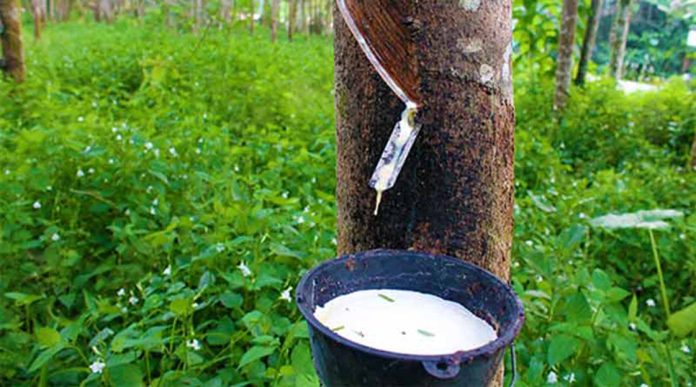The long-running call by stakeholders in the Ghana’s rubber sector for a curb on raw rubber exports has finally gained traction, as the government, in its 2026 Budget Statement, announced a decisive move to restrict the export of unprocessed rubber until domestic supply becomes sufficient.
The policy, hailed by industry players as a timely intervention, is expected to boost local processing capacity and stem the persistent shortage of feedstock that has crippled factories for years.
Paragraph 1028 of the budget statement as read by the Finance Minister, Casiel Ato Forson, is clear that government meant business to restrict raw rubber.
The Minister in the budget stated clearly that-to strengthen local manufacturing, exports of non-ferrous scrap metals and raw rubber will be restricted under the Feed the Industry Programme.
This will channel raw materials to domestic processors, support component manufacturing and build stronger value chains in metals and rubber based industries.
Mr Speaker, “our vision is clear, a Ghana that produce more than it consumes, a Ghana that exports value-added goods not raw materials amongst others,” he said.
This bold policy as announced by government appears to have calmed down nerves of stakeholders in the rubber sector who have been pushing for a complete restriction in the export of raw rubber.
Stakeholders such as a former Secretary General of the Ghana Agricultural Workers Union (GAWU), Chief Executive Officer of Association of Ghana Industries (AGI), Omanhene of Lower Dixcove, Nana Kwesi Agyemang, including the Western Regional Minister have been pushing for a ban on raw rubber export.
The stakeholders argue to it did not make sense to export raw rubber when local industries, for instance Ghana Rubber Estate Limited (GREL) did not have enough rubber to process.
GREL for instance has to cut down its shift system because of lack of raw rubber to process.
With government bold decision to restrict raw rubber export next year, rubber processors have hailed government decision on that.
Meanwhile, the Rubber Processors Association of Ghana (RUPAG) has in a press statement applauded the Government of Ghana for what it describes as a bold and timely intervention to safeguard the domestic rubber industry, following the announcement in the 2026 Budget to restrict the export of raw rubber (cuplumps).
The policy is intended to curb the rising export of unprocessed rubber — a trend RUPAG says has severely starved local factories of raw materials over the past decade.
According to the Association, raw rubber exports reached unprecedented levels in the last four years, spreading across all rubber-growing regions and draining critical inputs required for domestic processing.
This, they noted, weakened factory operations, triggered job losses, threatened outgrower financing schemes, and contributed to significant foreign-exchange leakages.
RUPAG described the new policy direction as “a critical and timely intervention” that realigns the natural rubber value chain with Ghana’s long-term industrialisation agenda.
Turning Point for the Industry
The Association emphasized that the restriction on raw rubber exports signals government’s responsiveness to long-standing concerns from stakeholders and marks a major turning point in efforts to strengthen value addition within the sector.
“With stable access to raw materials, domestic factories can operate at higher capacity,” RUPAG stated, adding that the move would boost Ghana’s economic gains through improved processing, foreign exchange retention and enhanced tax revenue.
Projected National Benefits
RUPAG highlighted several key outcomes expected from the policy, including: Stabilized supply of raw materials for local processors, Restoration of factory utilization and protection of industry investments, support for repayment of over GH¢650 million in outgrower loans, protection of more than 70,000 rural livelihoods across the rubber value chain, increased foreign exchange retention, support for the 24-Hour Economy and broader industrial transformation agenda.
Commitment to Production Expansion
The Association also pledged full collaboration with the government to ensure smooth implementation of the directive.
RUPAG revealed plans for an ambitious programme to increase national rubber production from 100,000 tonnes of dry rubber to 250,000 tonnes by 2035.
Key elements of the programme include;
Planting 10,000 hectares annually using subsidised high-yielding materials, strengthening budwood gardens and nursery systems, enhanced extension services and technical support,
promotion of sustainable farm management practices and improved farmer incomes through carbon credits and EUDR compliance premiums.
RUPAG said the initiative would secure long-term raw material supply, uplift rural incomes and cement Ghana’s position as a competitive global producer.
Describing the policy as historic, the Association commended government’s resolve to protect the future of the industry and rural livelihoods.
“This decision strengthens national economic resilience and propels Ghana’s industrialization drive,” RUPAG said, adding that it remains committed to working with all stakeholders to ensure successful implementation.
For more news, join The Chronicle Newspaper channel on WhatsApp: https://whatsapp.com/channel/0029VbBSs55E50UqNPvSOm2z









